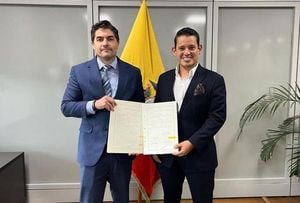Robert F. Kennedy Jr., President Donald Trump’s controversial pick for Secretary of the U.S. Department of Health and Human Services, took the hot seat during his Senate confirmation hearings this past week. With over three hours of rigorous questioning from senators, Kennedy faced considerable scrutiny surrounding his previous statements on vaccines, abortion, and various health policies.
On the first day of his hearings, Kennedy appeared before the Senate Finance Committee, where he attempted to distance himself from his history as one of the country's leading anti-vaccine advocates. Despite his efforts, senators clearly challenged his past claims, urging Kennedy to reconcile his previous statements with his current positions.
Senator Ron Wyden from Oregon cited Kennedy’s past comments on podcasts and interviews, stating, “No vaccine is safe and effective.” To this, Kennedy responded, asserting such statements were taken out of broader contexts. He insisted he is not against vaccines but is “pro-safety,” arguing he supports some vaccines he claims avert more problems than they cause.
When probing his stance on abortion, Senator Bernie Sanders confronted Kennedy about his rapidly shifting views. “A year and a half ago, you went to New Hampshire and stated the government should not dictate women’s choices. I’ve never seen any politician flip on this issue quite as quickly as you did when Trump appointed you,” Sanders remarked, pressing Kennedy to clarify his position. Kennedy maintained he believes all abortions are tragedies but added he would align with Trump’s policies.
Democratic Senator Raphael Warnock pressed Kennedy on previous comments where he compared the CDC's vaccine program to Nazi death camps, asking if he stood by those remarks. Kennedy firmly denied making such comparisons, stating, “I don’t believe I ever compared the CDC to Nazi death camps.” Reality, as highlighted by various news outlets, included Kennedy’s previous inflammatory remarks at autism conferences where he referenced the government’s treatment of children as akin to Holocaust victims.
Kennedy was also questioned by Senator Tina Smith from Minnesota on his claims linking school shootings to antidepressants, stating there was “tremendous circumstantial evidence” of such correlation. “Do you still believe this?” she asked. Kennedy stepped back, saying he only meant to suggest these links should be studied alongside others.
Throughout the hearings, Kennedy's comments on the COVID-19 pandemic were also highlighted. Senator Michael Bennet of Colorado was quick to call out Kennedy for previously stating, “COVID-19 is targeted to attack Caucasians and Black people,” which he labeled as dangerously misleading. Kennedy sought to clarify this remark but maintained some level of ambiguity, which frustrated lawmakers aiming to affirm the necessity of reliable information during public health crises.
While facing firm opposition from Democrats, Kennedy found unexpected support from some Republicans. Senator Rand Paul of Kentucky defended Kennedy, arguing he should be allowed to follow the science without being prematurely judged. “You may be the only one here who’s willing to listen to different viewpoints,” Paul said. Still, challenges remained as the committee navigated through various contentious topics during the hearings.
Kennedy tried to establish himself as someone who would tackle chronic diseases, pointing out, “Over 70% of adults and one-third of children are overweight or obese,” stating one of his priorities would be to address America’s health crisis. Yet, this goal must match against his mixed past messaging, which has drawn fierce criticism from public health experts.
The hearings have been contentious and highly publicized, attracting attention from health professionals, advocates, and the general public. Many expressed concerns about Kennedy's nomination, fearing his past skepticism may shape his future policies at HHS, impacting vaccine protocols and public health strategies across the nation.
Bi-partisan concern surrounding the nominee was palpable, leading to heated bipartisan exchanges, particularly around the viability of the controversial mifepristone abortion pill. Senator Tammy Baldwin brought up extensive data confirming the pill’s safety, prompting Kennedy to suggest he would implement any policy chosen by Trump, reflecting his wavering stance on such pivotal issues.
The significance of these hearings cannot be overstated as Kennedy looks to step atop one of the largest federal agency budgets, overseeing trillions of dollars dedicated to public health. His confirmation is poised to impact Americans' health policies significantly and may pave the way for new health reforms.
With the hearings spanning two days, the final outcomes remain uncertain. Supporters rallied behind Kennedy, urging senators to recognize the necessity for fresh perspectives within the healthcare framework. Meanwhile, opposition continues to echo sentiments questioning whether Kennedy’s past would translate to effective stewardship over America’s health policies. Kennedy's nomination serves as not just another political development, but as one reflecting broader debates on health, trust, and public safety throughout the nation.
The congressional scrutiny emphasizes the weight of the responsibility Kennedy would assume if confirmed and the potential ramifications for millions of Americans reliant on HHS's oversight.



